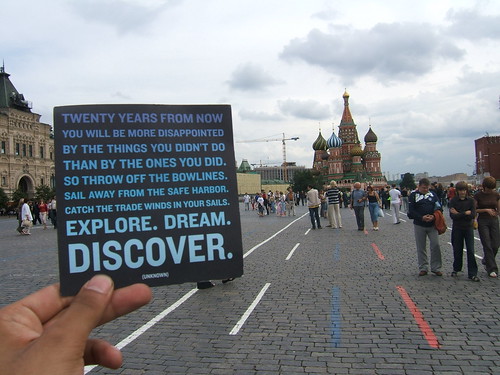Last summer I wrote an article for the Viator Travel Blog about Why We Travel. I don’t want to rehash my previous post, but the context is important. So let me restate my main argument:
Vagabondish is reader-supported. When you buy through links on our site, we may earn a small affiliate commission. Read our disclosure.
Kids these days, they don’t know a damn thing about travel.
Hmmm, in retrospect that may be just a little inflammatory, indicting an entire generation. Yet my argument was that today’s teens and ”˜tweens have been utterly corrupted by what passes for ”˜travel content’ on the internet, in magazines, and most crucially, on television. It’s not their fault. It’s the fault of the system. Of Big Media. Of crappy travel television programming that prioritizes the bottom line over decent travel content.
Needless to say, my thesis did not go down very well with young travelers. I was called a snob. I was called self-righteous. I was called old, out of touch, somebody who probably walked through five feet of snow back in the day. My own sister (age 18 at the time) accused me of being totally insensitive to her and her friends. Apparently I hurt a lot of feelings.
I said then (and still say now) that the truth sometimes hurts.
Since then, I’ve continued thinking about and debating this topic. My views have not changed. However I do agree that the situation is not as bad as I originally thought. There is room for optimism, maybe, just a little.
But first, the reasons to be glum.
The Glass Half Empty: Why We (Don’t) Travel
My generation came of age using Lonely Planet. We were all about discovering ourselves, and the world, through travel. Today’s generation seems more interested in extreme experiences. And in social networking that connects groups of like-minded people in real time, all the time.
Yet witness the latest crop of reality ”˜travel’ shows. I’m talking about Last One Standing, 1,000 Places to See Before You Die, Bizarre Foods, The Best Places to Find Cash and Treasure, Man vs. Wild, I Shouldn’t Be Alive, Going Tribal, Everest: Beyond the Limit, Survivorman, and one that really gets me annoyed, the television travesty known as Edge of Existence.
What’s the common thread in these shows? Extreme view points packaged in the tired ”˜reality TV’ format. In each of these shows there is a narrow focus on the presenters rather than the cultures and people they encounter. Silly me, I thought travel was all about discovering one’s self, and the world, through having new experiences and meeting new people. It’s not the extreme experience that counts, it’s the new experience that counts. It’s the face-to-face connections you make with new people and new cultures. It is not about going somewhere new and forgetting to step beyond the well-worn tourist path. It is not about checking email incessantly at the local internet café and playing Scrabulous with friends back home.
“But Scott,” you say, “maybe you’re just too old and boring to stay on top of these new trends in travel.” OK, sure, I admit that is a possibility. But before I admit defeat, let me point out a few sobering facts about today’s 18 — 24 years olds (at least American 18 — 24 years olds, it’s hard to find similar data for European, Aussie, Canadian and others):
- 63% cannot find Iraq on a map.
- 88% cannot find Afghanistan on a map.
- 70% have never traveled outside the USA.
- Only 22% own a passport.
These numbers don’t mean too much on their own. Yet they look worrying next to 2006 data showing a decline in volunteer & study abroad programs; a drop in studying foreign languages in the first 2 years of college; and an increase in young Americans who say “it is not important” to pay close attention to foreign news and events.
So what’s the big deal?
On one hand, there is nothing new here. Nobody would claim Americans are especially worldly, so it’s not surprising that fewer the 3 in 10 under age 24 have ever traveled outside the USA.
But here’s the thing. Over the past 8 years the reputation of the USA has taken a major beating (Bush, Iraq, Abu Ghraib, Guantanamo, you get the picture). At the same time, the U.S. has made it much harder for foreign travelers to visit thanks to a slew of new passport controls and visa restrictions.
Now the U.S. economy appears headed into a recession. The US dollar is worth fewer pounds, euros, baht and rupees. Traveling abroad is more expensive. Terrorism and anti-American violence is on the rise. When you stop and think about it, there are a lot of reasons why Americans (and young Americans in particular) are not traveling as much as they did even 10 years ago.
And the mainstream media is capitalizing on this new insularity and new worldview conservatism. New TV programming panders to the well-heeled kids who can still afford a weekend shopping spree in London or Paris. And panders to the kids who’ve never been abroad, don’t know what it’s like, and can’t afford to discover it for themselves.
So at a time when it’s getting harder enough for Americans to experience the world (and equally hard for the world to experience Americans), our media outlets serve up a non-stop menu of travel fantasy, extreme travel, near-death travel, travel as freak show, but little else. I worry that, thanks to the explosion of mediocre reality-television shows, travel in our pop culture is becoming a mere synonym for testing your limits. For putting yourself into extreme situations. For getting sun stroke. For eating bugs.
And these are not reasons why we should travel.

© [Satbir]
The Glass Half Full: Why We Travel
Let me ask you this: If you wanted to learn more about the Greek islands, say, or the literary history of Paris’ cafes, or maybe get tips on trekking through the rainforest of Brazil, where would you go on television to find it?
Nowhere.
Instead you’d go to Google, or YouTube, or Flickr or to a host of online sites offering a chaotic mix of world views, travel tales, first-hand trip accounts and more. And there’s absolutely nothing wrong with this.
Just the opposite, in fact: the web will eventually transform this generation of travelers into a force of good. I think we’re still a few years away from achieving this vision, but you can see the rough outlines taking shape today.
The upside to 24/7 connectivity — to Facebook and MySpace friends, to phones that support email and Instant Message no matter where you live or travel, in dozens of countries — is that today’s teenagers and ”˜tweens have access to millions of unique, real, uncorrupted voices. And this is a huge advantage when planning a travel experience. If you want to connect with a peer in Mumbai or Sydney, Istanbul or Mexico City, it’s incredibly easy to do so. If you want to plan an entire trip couch surfing with strangers in foreign countries, it’s incredibly easy to do so.
The challenge, of course, is simply doing it.
And learning the difference between travel planning and travel doing. I’ve met too many teenagers who talk about taking a trip, but then don’t or can’t. I’ve watched too many shows on cable and broadcast TV aimed at convincing kids that foreign shopping sprees and travel are the same thing.
I’m not sure how to fix the problem, but I will say this. If everybody in the 15 — 24 age bracket followed even one piece of my humble advice, I do think the world would be a better place. If you have an opportunity to travel abroad, take it. If you have an opportunity to study abroad, take it. Turn off the television, throw away the guidebook, turn off your phone, don’t check email, don’t get near a computer. Put on a backpack, and just go. Anywhere. It doesn’t really matter. Just go.
Because that is why we travel.



